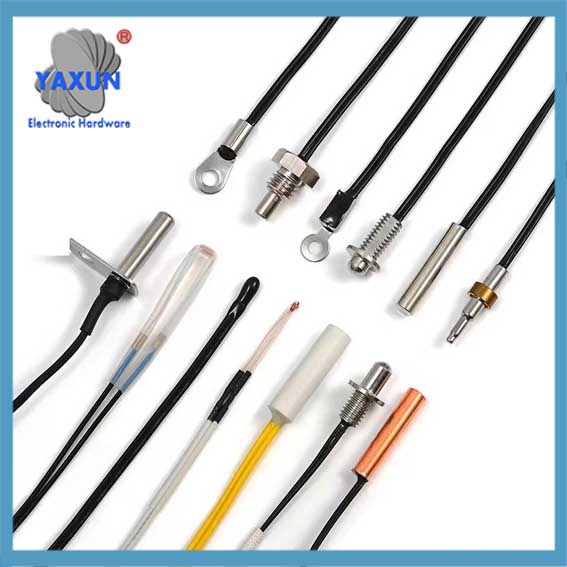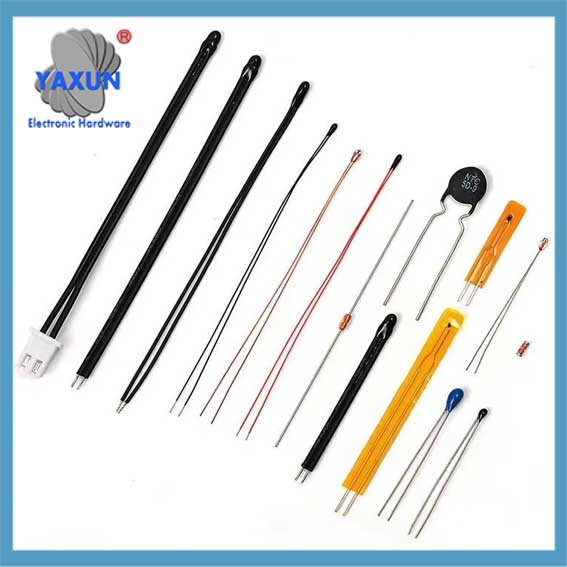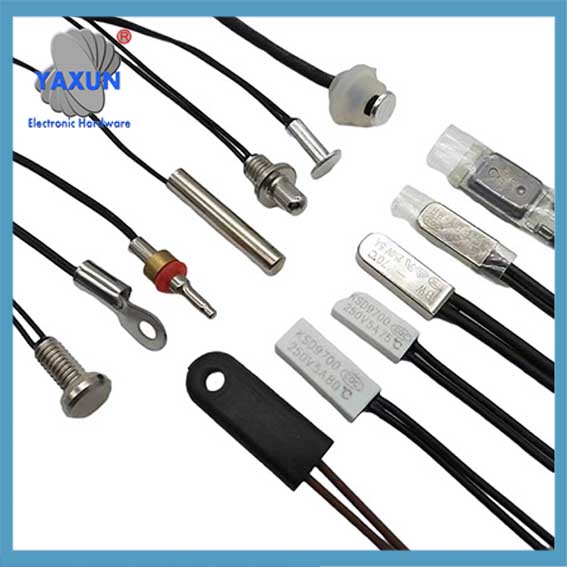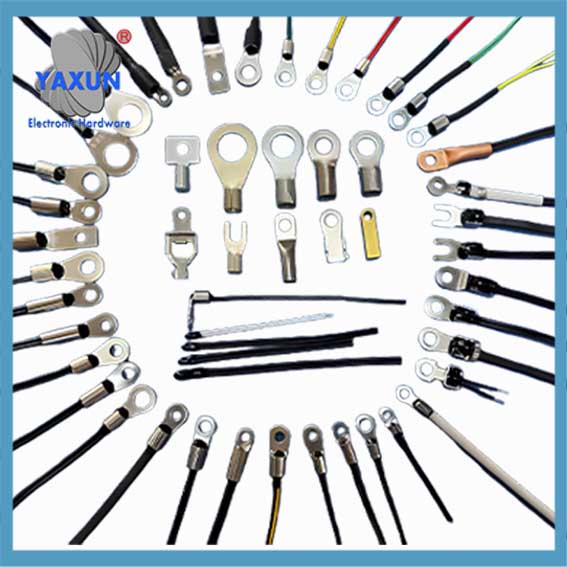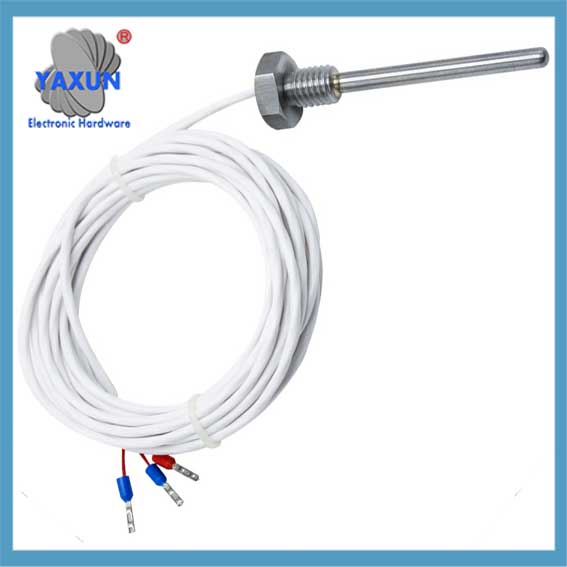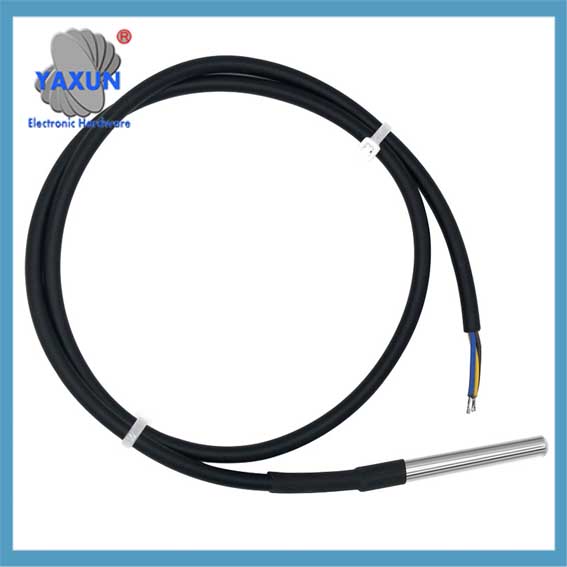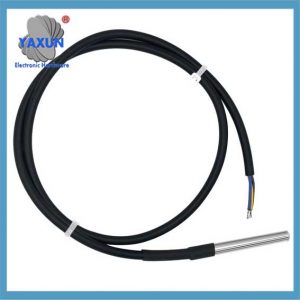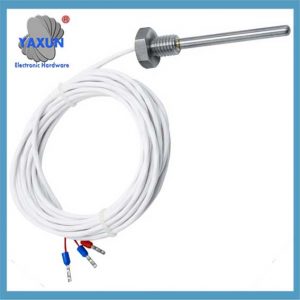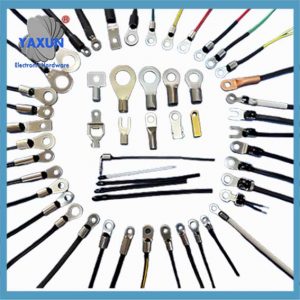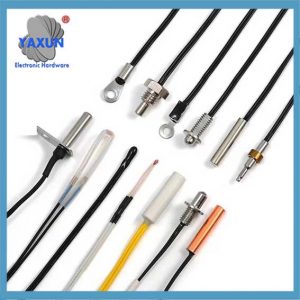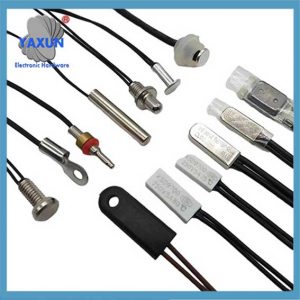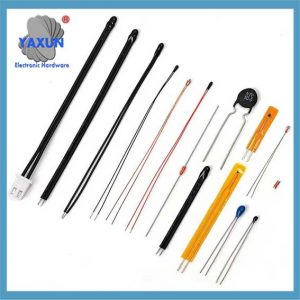Categorii de produse
- Întrerupător termic 20
- Suport cutie siguranțe 36
- Senzor de temperatura 67
- Comutator termic 64
- Siguranță auto 19
- Siguranțe înșurubate 7
- siguranță termica 32
- siguranțe de suprafață 12
- termistor 22
- Suport pentru siguranțe montat pe PCB 27
- Ham de cabluri 6
- Suporturi pentru siguranțe cu lame 17
- termostat 46
- Siguranta electrica 14
Etichete de produs
Postări recente
Sonde de temperatură, Tipuri de senzori de temperatură & aplicatii
A temperature probe is a device used to measure temperature, usually consisting of a sensitive element and a measuring circuit. The sensitive element can be a thermocouple (pt100, pt1000), a thermal resistor (ntc, ptc), a semiconductor (DS18B20 digital), etc., which can convert temperature changes into electrical signals. Then it is amplified, filtered, converted, and processed by the measuring circuit, and finally an electrical signal proportional to the temperature is output.
Temperature probes and temperature sensors are two different devices, and they have their own characteristics and application scenarios in measuring temperature.
Temperature Probe
A “temperature probe” is a sensor used to measure temperature by converting the heat energy into a measurable electrical signal, and the most common types of temperature sensors within a probe include thermocouples, Resistance Temperature Detectors (RTD-uri), and thermistors, each with distinct characteristics and applications based on the required accuracy, interval de temperatură, and response time needed for a specific situation.
Definition: A temperature probe is a device used to measure temperature, usually consisting of a sensitive element and a measuring circuit. The sensitive element can be a thermocouple (pt100, pt1000), a thermal resistor (ntc, ptc), a semiconductor (DS18B20 digital), etc., which can convert temperature changes into electrical signals. Then it is amplified, filtered, converted, and processed by the measuring circuit, and finally an electrical signal proportional to the temperature is output.
Working Principle: The working principle of the temperature probe is to use the response of the sensitive element to temperature changes to convert temperature changes into electrical signals. Common sensitive elements include thermocouples, thermal resistors, semiconductors, etc. The working principle of the thermocouple is to use the thermoelectric effect of two different metals or alloys. When they are connected together and at different temperatures, an electromotive force proportional to the temperature is generated. The working principle of the thermal resistor is to use the property that the resistance of metal or semiconductor materials changes with temperature. When the temperature changes, the resistance value will also change accordingly. The working principle of semiconductor is to use the property that the conductivity of semiconductor material changes with temperature. When the temperature changes, the conductivity will also change accordingly.
Type: The types of temperature probes mainly include thermocouple probes, thermal resistor probes, semiconductor probes, etc. Thermocouple probes use thermocouples as sensitive elements, and have the characteristics of wide measurement range, fast response speed, and high precision. Thermal resistor probes use thermal resistors as sensitive elements, and have the characteristics of high measurement accuracy, good stability, and strong anti-interference ability. Semiconductor probes use semiconductors as sensitive elements, and have the characteristics of small size, greutate redusă, and low power consumption.
Application fields: Temperature probes are widely used in industry, scientific research, medical care, environmental protection and other fields. Such as temperature measurement and control in chemical, petroleum, metallurgy, electricity, pharmaceutical, food and other industries.
DS18B20 Temperature Sensor Cable with Probe
Wiring: Red(VCC), Yellow(Data), Negru(GND)
Wide temperature range of -55 ℃ ~ +125 ℃
Power supply: 3.0V ~ 5.5V
Tips: Using a 4.7K resistor between the Data and VCC will make the testing of the probe easilier.
Termocuple:
Funcţie: Generates a voltage difference based on the temperature at the junction of two dissimilar metal wires.
Pros: Gama largă de temperatură (-200°C to 1750°C), relatively inexpensive, fast response time.
Cons: Lower accuracy compared to other sensors, requires calibration tables to convert voltage to temperature.
Aplicații: High-temperature applications like furnaces, engine monitoring, industrial processes.
Thermistor:
Applications of Temperature Probes:
Industrial Processes: Monitoring temperature in manufacturing processes like ovens, reactors, and extruders.
HVAC Systems: Regulating room temperature in buildings by monitoring air temperature.
Food Safety: Monitoring food temperature during cooking and storage to ensure food safety.
Medical Devices: Measuring body temperature in patients through probes inserted into the body.
Industria Auto: Monitoring engine coolant temperature and cabin temperature.
Scientific Research: Precise temperature measurements in experiments.
Senzor de temperatura
Definition: A temperature sensor is a device that can convert temperature changes into electrical signals. It usually consists of a sensitive element and a signal processing circuit. The sensitive element can be a thermocouple, rezistenta termica, semiconductor, etc. The signal processing circuit can be an analog circuit, a digital circuit, etc., which together complete the acquisition, processing and output of temperature signals.
Working principle: The working principle of the temperature sensor is similar to that of the temperature probe. It also uses the response of the sensitive element to the temperature change to convert the temperature change into an electrical signal. Cu toate acestea, the temperature sensor usually has a more complex signal processing circuit, which can perform more advanced processing on the temperature signal, such as digital conversion, data storage, communication, etc.
Type: The types of temperature sensors mainly include analog temperature sensors, digital temperature sensors, and intelligent temperature sensors. Analog temperature sensors output analog signals, which need to be converted into digital signals through analog-to-digital converters. Digital temperature sensors directly output digital signals, and have the characteristics of strong anti-interference ability, Precizie înaltă, and easy integration. Intelligent temperature sensors have functions such as self-diagnosis, self-calibration, and communication, and can realize remote monitoring and control.
Features: The temperature sensor has the characteristics of high measurement accuracy, good stability, strong anti-interference ability, and easy integration. Different types of temperature sensors have different characteristics, such as analog temperature sensors require analog-to-digital converters, digital temperature sensors directly output digital signals, and intelligent temperature sensors have functions such as self-diagnosis, self-calibration, and communication.
Application fields: Temperature sensors are widely used in smart home, smart wearable, medical equipment, industrial automation, environmental monitoring and other fields, such as air conditioners, frigidere, masini de spalat rufe, thermometers, sphygmomanometers, industrial control systems, etc.
How to choose?
When choosing a temperature probe or temperature sensor, the following factors need to be considered:
Application environment: Consider whether the measured environment has special conditions such as corrosiveness, high temperature, high pressure, etc., so as to select suitable materials and protection levels.
Measurement range: Select a suitable sensor according to the range of the temperature to be measured to ensure that the sensor can accurately measure within the required range.
Accuracy requirements: Select a sensor with corresponding accuracy according to the accuracy requirements of the application for temperature measurement.
Cost budget: Select a cost-effective sensor according to budget constraints.
How to use?
When using a temperature probe or temperature sensor, the following matters need to be noted:
Installation: Install it correctly according to the installation instructions of the sensor to ensure that the sensor is in good contact with the object to be measured and avoid measurement errors caused by improper installation.
Wiring: Correctly connect the signal line and power line of the sensor to ensure the stability and accuracy of signal transmission.
Calibration: Calibrate the sensor regularly to ensure that its measurement accuracy meets the application requirements.
Maintenance: Clean and maintain the sensor regularly to avoid dust, dirt, etc. affecting the measurement performance of the sensor.
Temperature probe sensor is one of the important products of our YXAUN company. We focus on the fields of intelligent manufacturing and industrial automation, and provide a series of high-precision and stable measurement and control equipment, including temperature probe sensors. Our temperature probe sensors are widely used in industrial manufacturing, environmental monitoring, energy management and other industries with their high precision, stability and adaptability to complex environments. If you have specific needs or questions about our temperature probe sensors, please feel free to consult us. We will wholeheartedly provide you with professional answers and services. What aspect of the temperature probe sensor do you want to know?
How to choose a suitable temperature probe sensor?
When choosing a temperature probe sensor, consider the temperature measurement range, cerințe de precizie, response speed and installation environment. De exemplu, thermocouples or platinum resistance can be selected for industrial environments, PT100 for high precision, and thermocouples for fast response.
Contactaţi-ne
Aștept e-mailul dvs, vă vom răspunde în termen 12 ore cu informații valoroase de care aveai nevoie.
 English
English العربية
العربية Български
Български 粤语
粤语 中文(简体)
中文(简体) 中文(漢字)
中文(漢字) Nederlands
Nederlands Suomi
Suomi Français
Français Deutsch
Deutsch Ελληνικά
Ελληνικά Magyar
Magyar Italiano
Italiano 日本語
日本語 한국어
한국어 Polski
Polski Português
Português Română
Română Русский
Русский Slovenščina
Slovenščina Español
Español Svenska
Svenska ภาษาไทย
ภาษาไทย Türkçe
Türkçe Tiếng Việt
Tiếng Việt
